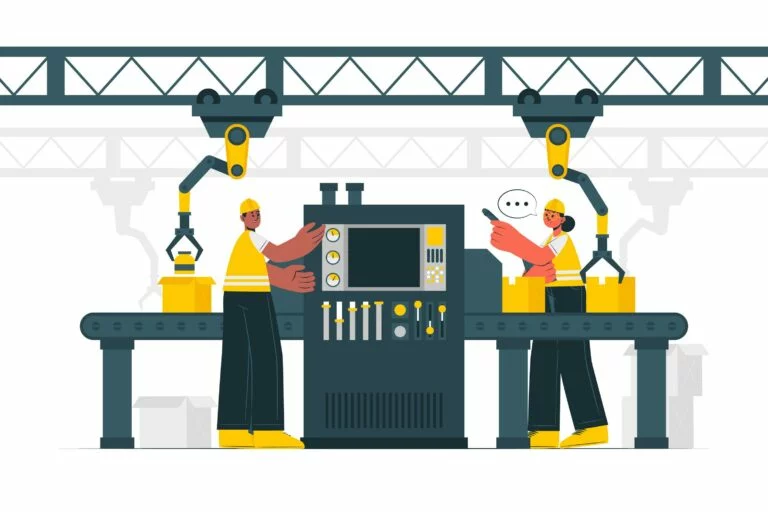In the world of making things, managing contracts has become a big deal. It’s all about making everything run smoother and getting more done without tripping over paperwork. With Contract Lifecycle Management software, companies that make stuff can handle their contracts from start to finish way more easily than before.
This blog is going to take you through how handling contracts in the manufacturing world has changed, what kind of headaches these companies face when dealing with them, and why CLM tools are such a game-changer. We’ll also look at some real examples where using CLM made things better for manufacturers and gave them an edge over others.
By getting into how tech plays its part in keeping contract management on point and taking advantage of CLM solutions, makers can get their operations slicker, stay on the right side of rules more easily, dodge problems better, and pump up their productivity.
The Evolution of Contract Management in the Manufacturing Industry
In recent years, the manufacturing industry has changed because of digital transformation. This change means that instead of using paper, companies are now managing their contracts digitally. Manufacturing companies are working hard to make their processes smoother and more efficient, and handling contracts properly is a big part of this effort. Using Contract management software has been key in helping with the automation and management of complicated business contracts from start to finish throughout their entire lifecycle.
From Paper-Based to Digital
Back in the day, managing contracts in the manufacturing world was a big headache. Everything was done on paper, which took forever and often had mistakes. Trying to make, keep track of, and find these contracts usually ended up causing more problems than it solved. But then technology got better, and things started changing for manufacturing companies.
With new digital ways to handle contracts coming into play along with product lifecycle management (PLM) systems and enterprise resource planning (ERP) tools joining forces, everything about contract management got a whole lot smoother for those in the manufacturing industry. This change meant that manufacturers could now deal with their contracts online from start to finish. It made working together easier; everyone could see what was happening when it happened; plus sticking to rules became less of a hassle.
The Role of Technology in Modern Contract Management
In manufacturing, technology is crucial for managing contracts. Tools like PLM (Product Lifecycle Management) and ERP (Enterprise Resource Planning) help companies work more efficiently, improve product quality, and easily keep track of agreements.
With CLM systems working together with PLM and ERP, manufacturers have one place where they can take care of all their contract needs. This setup makes creating contracts a breeze by automating most steps – from starting them up to getting them signed off on. It cuts down on simple mistakes and saves a ton of time too.
CLM tools offer useful features like alerts for contract updates, performance tracking, and secure online storage. This helps manufacturing businesses stay compliant and efficient throughout the contract lifecycle.
Thanks to advancements in enterprise systems like PLM and ERP, along with integrated CLMs, manufacturers now have better visibility into their agreements from start to finish. This improved clarity helps them stay organized and compliant.
Related Article: Top 10 Contract Management Software: Best CLM Tools in 2024
Types of Contracts Used in the Manufacturing Industry

Private Label Manufacturing
These contracts specify that the manufacturer will produce a finished product according to the client’s specifications and handle the shipment to the client’s warehouse or store. This is ideal for businesses wanting to produce products with minimal effort.
Individual Component Manufacturing
These agreements outline the terms for the manufacturer to produce specific components or parts of a more complex product. The client is responsible for assembling the final product. This is suitable for businesses that manage some manufacturing processes in-house but need external help for certain components.
Labor or Service Subcontracting
These contracts outline the terms for hiring a specialist subcontractor to perform tasks that the primary contractor’s in-house team can’t handle. This is useful for businesses with complex products or those looking for faster or more cost-effective production of certain parts.
End-to-End Manufacturing
Similar to private label agreements, these contracts include extra provisions for the manufacturer to give feedback on product design. The manufacturer helps optimize the design for cost-effective and efficient production, handling everything from design to assembly and shipping. This is ideal for businesses that want to create high-quality products quickly and at the lowest possible cost.
Related Article: How Can Pharmaceutical Industry Benefit From CLM Software
Challenges in the Manufacturing Sector

Manual Contracting Issues
Manual contracting issues significantly hinder manufacturing companies. Managing contracts manually is challenging, leading to a lack of visibility into supplier terms. This opacity prevents companies from realizing the full value of their agreements, ultimately impacting their overall efficiency and profitability.
Supplier Relationship Management
Establishing and maintaining relationships with suppliers is critical for manufacturing companies. Effective supplier management is essential for optimal business performance, ensuring a steady supply of necessary materials and services. By fostering strong supplier relationships, companies can drive revenue growth, benefiting from reliable partnerships and better terms that contribute to overall success.
Disrupted Supply Chains
Manufacturing companies face significant challenges due to disruptions in supply chains, which can lead to delays and increased costs. These disruptions necessitate a rapid response to new challenges to maintain business continuity. Removing delays in the contracting process is crucial in these situations. Streamlined contracting helps companies adapt quickly and efficiently to changing conditions, leading to smoother operations and less downtime.
Enforceable Business Events
Quickly adapting to enforceable business events is essential for manufacturing companies, as it helps them respond to sudden changes and requirements. This has increased the focus on contract management and optimization, making sure contracts are handled efficiently and aligned with business goals. Companies can better navigate these events by improving contract management and enhancing their agility and overall performance.
Related Article: Contract Management Software (CLM) For Transportation Industry
Advantages of Implementing Contract Management Software

Enhancing Operational Efficiency and Reducing Waste
Using CLM solutions streamlines processes reduces errors and delays, and centralizes all contract-related activities in one place. It improves teamwork and coordination, saving time and effort in managing contracts from start to finish. This reduces unnecessary waste, boosts overall efficiency, and enables faster delivery of products to customers.
Improving Compliance and Mitigating Risks
CLM solutions help manufacturers follow industry regulations and reduce contract-related risks. They simplify creating, modifying, and maintaining contracts to ensure compliance with standards and laws. They also provide secure contract storage with controlled access. This improves agreement management, helps avoid legal issues, and ensures the company stays compliant with industry rules.
Related Article: What Is A Contract Repository? Effective Contract Storage
How CLM Facilitates Better Supplier Relationships?

For manufacturing companies, one of the main perks of using CLM solutions is that they help improve relationships with suppliers. By having a single place where all contract information is kept, the software makes it easier for manufacturers to handle agreements with vendors and makes these relationships stronger.
- With everything about contracts in one spot thanks to CLM solutions, both manufacturers and their suppliers can easily find what they need. This means everyone stays on the same page, cutting down on confusion or mix-ups.
- Managing vendor contracts becomes smoother with CLM because it takes care of every step from starting a contract to renewing it. Manufacturers can keep an eye on how well contracts are doing, watch important dates closely, and get reminders when needed. All this helps build trust and openness between them and their suppliers.
- Cutting down procurement costs comes next since automating the contracting process gets rid of mistakes made by hand and lessens back-and-forth talks during negotiations. Contracts get sorted out quicker which not only saves time but also money for manufacturers.
By taking advantage of what CLM offers, manufacturing firms can better manage their dealings with vendors which leads to working more smoothly together as partners while boosting efficiency across the supply chain.
Related Article: How To Manage Contracts Efficiently: Best Practices
CLM Software for the Manufacturing Industry

Contract Lifecycle Management software tailored for the manufacturing industry helps companies efficiently handle all stages of their contracts. It provides tools to create, store, manage, and analyze contracts throughout their lifecycle, from initiation to renewal or termination. This software centralizes contract data, making it easier to access and ensuring compliance with industry regulations and internal policies.
CLM software in manufacturing enhances efficiency by automating tasks like contract drafting, approval workflows, and renewal notifications. It also improves visibility into contract terms, obligations, and performance, helping manufacturers reduce risks, optimize supplier relationships, and achieve better financial outcomes. Overall, CLM software empowers manufacturing companies to streamline operations, enhance compliance, and make informed strategic decisions related to contract management.
CLM Features that Benefit the Manufacturing Industry
- Centralized Repository: Stores all contract-related information in one accessible location, improving organization and facilitating easy retrieval.
- Automated Workflows: Streamlines contract approval processes and tasks, reducing manual effort and accelerating contract lifecycles.
- Obligation Management: Tracks and manages tasks, deadlines, and commitments outlined in contracts with suppliers and stakeholders, ensuring compliance and reducing disputes.
- Analytics and Reporting: Provides insights into contract performance, supplier relationships, and financial impacts, aiding in strategic decision-making and optimization of contract strategies.
Related Article: AI And Law: Comprehensive Guide To Stay Up To Date
Why Choose Volody’s CLM Software?

Volody’s AI contract management software is made for manufacturing businesses to prevent revenue loss by giving better insight into supplier terms and effectively tracking vendor performance. It helps manufacturers streamline contract management processes, cut costs, and improve collaboration with suppliers to speed up time to market and boost revenue.
This software enhances operational efficiency and productivity by giving real-time updates on contract statuses and timely reminders for obligations. It ensures that businesses can efficiently manage both purchasing and sales contracts, reducing the risk of revenue loss and optimizing overall performance.
Features of Volody’s AI CLM Software
Customizable Templates
Customizable templates provided by CLM solutions offer manufacturing industries a streamlined solution for creating contracts tailored to their specific needs.
These templates can be easily changed to fit industry rules, laws, and specific business terms. This makes managing contracts easier and ensures companies follow the rules. It saves time and lowers mistakes. Plus, it lets companies adjust to changes in business easily.
Approval Workflows
Approval workflows provided by CLM solutions offer manufacturing industries a structured process for reviewing and approving contracts. These workflows automate the approval process, ensuring that contracts undergo necessary reviews and approvals from designated stakeholders.
This helps streamline operations by reducing delays and ensuring compliance with internal policies and regulatory requirements. CLM solutions help manufacturing companies manage contracts better by making the approval process clear and accountable. This reduces the risks that come with manual approval methods.
Obligation Management
Obligation management, offered by CLM Solutions, provides manufacturing industries with a systematic approach to tracking and fulfilling contractual obligations. This feature helps companies keep track of tasks, deadlines, and commitments in contracts with suppliers, customers, and other stakeholders.
CLM solutions centralize tracking of obligations, ensuring everyone meets their responsibilities. This lowers the chance of disagreements and improves how well contracts are followed. This capability enhances operational efficiency and strengthens relationships by ensuring timely fulfillment of contractual obligations.
Related Article: Elevate Technology Industry With Contract Management Software
Frequently Asked Questions
What Makes CLM Solutions Superior to Traditional Contract Management?
CLM solutions bring a lot of benefits compared to the old way we handle contracts. Here’s why CLM is better:
- By automating contract processes, CLM cuts down on mistakes that happen when things are done by hand and makes everything flow smoother. This means contracts get sorted out quicker and everything works more efficiently.
- With CLM, you can see what’s happening with your contracts in real-time, including important milestones and how well they’re doing. This helps make smarter decisions, lowers the chance of overlooking something important, and keeps things in line with rules and regulations.
How Quickly Can Manufacturers Expect to See ROI from CLM Implementation?
When a manufacturing company chooses to use CLM, the benefits can vary based on their goals. Generally, after implementing CLM, manufacturers often save money and operate more efficiently within a few months. This shows that they typically find CLM to be a worthwhile investment.
Conclusion
To wrap things up, managing contracts in the manufacturing world gets a whole lot better with Contract Lifecycle Management solutions. By moving from old-school paper methods to online systems, companies can work more smoothly, cut down on unnecessary stuff, and stick to rules while keeping risks low.
The big wins of bringing CLM into the picture are making everything run smoother with suppliers, saving money big time, and improving how things get done day-to-day. Stories from real life show us just how much CLM can help businesses grow by offering clear benefits. With a well-thought-out plan for starting and carrying it out, these tools make switching over easy peasy and quickly pay off for those looking to get their contract management game on point in the manufacturing sector.






